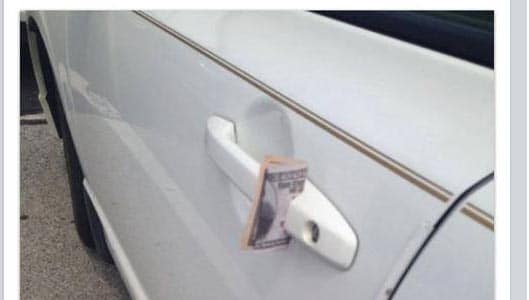Are robbers using chemically laced $100 bills to incapacitate drivers? Fact Check
Rumours are circulating social media that assert robbers are placing $100 bills laced with debilitating chemicals onto parked cars in an attempt to cause the returning driver to pass out and thus making them vulnerable to attack.
 FALSE
FALSE
An example of this warning taken from Facebook can be seen below –
Came out the store with my sister and this was on my car! I climbed in from the other side she drove us through a car wash so we didn’t touch it! The rumors going around are people putting 100 on your car with chemical to make you pass out so they can kidnap you hurt you and take your car! Females watch this I thought it was a joke. Well it just happened to us so we drove around until we seen no one from the parking lot anymore.
While the warning certainly gives new meaning to the term “drug money”, the warning is a hoax and should not be taken seriously. “Scarelore” rumours aimed at female motorists that are passed between social media users are incredibly common. And if the above rumour seems a little familliar, there is a reason for that. The claim that crooks have taken to chemically-laced 100 dollar bills as a means to incapacitate their victims appears to be nothing more than a “spin-off” derived from two very similar rumours that are both equally as spurious…
Sponsored Content. Continued below...
Of those similar rumours, one claimed that criminals are using fake perfume samples or business cards in car parks to incapacitate victims, and secondly a long running hoax that claimed criminals were using fake dollar bills to trick motorists into exiting their parked vehicles and thus making them vulnerable to attack. Both of these rumours were baseless, and so is this one.
Just as with the fake perfume sample hoax we referenced above, the inherent problem with this tale is that there are no drugs strong enough to completely incapacitate a victim from a mere whiff or touch. This tale also begs the question as to why crooks are using $100 bills as bait? If the chemical they were using to debilitate their victims was so strong or potent, would smearing the chemical on the car or car door itself not prove sufficient (and much less suspicious?)
Sponsored Content. Continued below...
The author of the message also explains they didn’t touch the $100 note and instead disposed of it in a car wash, and as such this begs the question of how the author determined that the bill was tainted in the first place? It seems more likely that the author simply fabricated the account, or that they misinterpreted a perfectly innocent non-tainted flyer, many of which are disguised as dollar bills to pique interest. (Incidentally, fake dollar bill flyers are what more than likely led to the similar hoax that claimed crooks were using fake dollar bills on windscreens to entice vulnerable motorists into leaving their vehicles.)
For the sake of thoroughness, we searched online for any reported crimes or verified warnings matching the description outlined in the warning – which was difficult to do since it did not mention a date or location – and found nothing.
As such, we rank this warning false.
Keep up-to-date with all our latest articles. Follow us on Facebook, Instagram and Twitter.
Continued below...
Thanks for reading! But before you go… as part of our latest series of articles on how to earn a little extra cash using the Internet (without getting scammed) we have been looking into how you can earn gift vouchers (like Amazon vouchers) using reward-per-action websites such as SwagBucks. If you are interested we even have our own sign-up code to get you started. Want to learn more? We discuss it here. (Or you can just sign-up here and use code Nonsense70SB when registering.)
Become a Facebook Supporter. For 0.99p (~$1.30) a month you can become a Facebook fan, meaning you get an optional Supporter Badge when you comment on our Facebook posts, as well as discounts on our merchandise. You can subscribe here (cancel anytime.)
